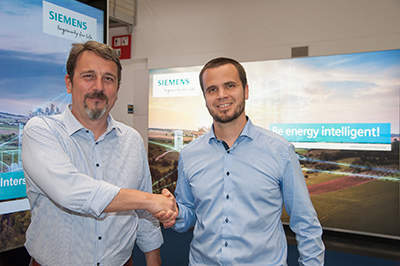Siemens and SOLARKIOSK have signed a Memorandum of Understanding (MoU) on June 20 at the Intersolar trade show.

Image: SOLARKIOSK Sales & Marketing Director Thomas Rieger and Siemens Microgrid Head Constantin Ginet. Photo: Courtesy of Siemens AG.
Both companies agree to join forces to enhance local businesses powered by SOLARKIOSK’s clean energy in non-electrified parts of rural Africa. SOLARKIOSK has deployed more than 250 projects in twelve countries serving roundabout 5 million people. The SOLARKIOSK solar powered E-HUBB is the business centerpiece for a rural “off-grid” village providing retail and energy related services such as charging (mobile phones, batteries, lights), internet connectivity, cooling of products and medication, water purification, copy, print or scan, financial inclusion services as well as news and entertainment to local communities.
In the first joint project, Siemens will implement a microgrid gateway collecting data from both SOLARKIOSK’s existing energy systems and retail businesses and enabling remote control of the E-HUBB, thus improving service, energy usage and operation such as supply chain management. The gateway will be connected to applications running on Siemens’ highly scalable EnergyIP smart grid application platform powered by MindSphere – the Siemens cloud-based open operating system for the Internet of Things (IoT). In a next step the companies will tailor the microgrid cloud based applications and related solution to the needs of the different stakeholders. In addition, further industrialization of electrical equipment as well as enhancement of the solution with Siemens equipment such as local microgrid control or small batteries/ inverter kits will be evaluated by SOLARKIOSK.
“With Siemens’ microgrid applications powered by MindSphere, SOLARKIOSK will be able to improve serviceability of the electrical equipment and make sure the energy is used in the most efficient way. Furthermore the analyzed data supports SOLARKIOSK in making the most economic decisions by evaluating productivity of different service offerings”, said Ralf Christian, CEO of Siemens’ Energy Management Division. “If the B2B microgrid grows further you can do even more with the collected data and local control capability. That’s our motivation for a co-creation agreement to define the next system generation maximizing value for all partners.”
“SOLARKIOSK is thrilled to develop together with Siemens software applications and algorithm which correlates our unique ability to collect valuable energy and commercial data and therefore analyses the energy impact on the various businesses we empower and vice versa. The joint collaboration will refine our retail operations and service offering to B2B customers throughout our African and global network. The insight gained from this disrupting approach will enable SOLARKIOSK to take its impact and business goals to the next level,” said Andreas Spieß, CEO of SOLARKIOSK.
For the project, Siemens will deliver and install a suitable and robust data gateway for aggregating the necessary data and remotely control loads and generation using its proven EnergyIP. Numerous EnergyIP applications have been successfully used around the world for years. They include applications for meter data management and distributed energy management, energy efficiency applications for the energy sector and for industry, and various applications for data analysis, such as load prediction in the grid and tracing system losses.
In 2016 the Siemens Stiftung and SOLARKIOSK partnered to bring a mobile health clinic to a host community for refugees in Jordan. The clinic consists of a self-sufficient E-HUBB developed by SOLARKIOSK outfitted with Siemens medical equipment, including an ultrasound and hematology lab. It is powered by 8 kWp of solar panels on the roof, making it off-grid and fully mobile. The clinic is a small, flexible and modular unit, adaptable for many further locations and functions.
Source: Company Press Release
